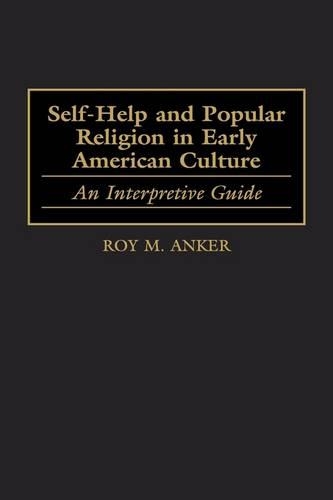
Self-Help and Popular Religion in Early American Culture: An Interpretive Guide
(Hardback)
Publishing Details
Self-Help and Popular Religion in Early American Culture: An Interpretive Guide
By (Author) Roy M. Anker
Bloomsbury Publishing PLC
Greenwood Press
30th November 1999
United States
Classifications
Tertiary Education
Non Fiction
Religion: general
Cultural studies
200.973
Physical Properties
Hardback
256
Width 156mm, Height 235mm
567g
Description
One of two volumes on the relationship between popular religion and the self-help tradition in American culture, this book focuses on early America, from the Protestant Ethic and Puritan New England through Revivialism and American Romanticism. The concept of self-help is a distinctive part of the American character of individualism. This volume provides an introductory interpretive guide to major self-help figures and movements with origins in popular religious movements. The opening chapter recounts the perspectives and conclusions of previous histories of American self-help and includes analyses of several important related works. The following chapters present a historical narrative that traces those junctures where American history and popular religion have reputedly and actually intersected. In surveying the historical and scholarly materials that depict the history of popular religion and self-help, this volume emphasizes the historiographical debates that shape the interpretation of the ideas and figures. This reference will serve as a valuable research tool for American religion and popular culture scholars. Arranged chronologically, this volume discusses, in three major sections, the Protestant Ethic and Puritan New England; Benjamin Franklin, Cotton Mather, and Individualism; and Revivalism, Religious Experience, and the birth of mental healing. An extensive bibliography is included.
Reviews
Anker... provide[s] an important starting point for further research into the connection between popular religion and self-help traditions....[The book] will provide a reliable resource for those who take up various facets of this project.-The Journal of Religion
Libraries with good collections on the topics mentioned might well include Anker's works for their review of relevant secondary sources.-Choice
"Anker... provides an important starting point for further research into the connection between popular religion and self-help traditions....The book will provide a reliable resource for those who take up various facets of this project."-The Journal of Religion
"Libraries with good collections on the topics mentioned might well include Anker's works for their review of relevant secondary sources."-Choice
"Anker... provide[s] an important starting point for further research into the connection between popular religion and self-help traditions....[The book] will provide a reliable resource for those who take up various facets of this project."-The Journal of Religion
Author Bio
ROY ANKER teaches English and Film at Calvin College in Grand Rapids, Michigan. In addition to many scholarly and popular essays, he edited and co-wrote Dancing in the Dark: Youth, Popular Culture, and Electronic Media (1991).
